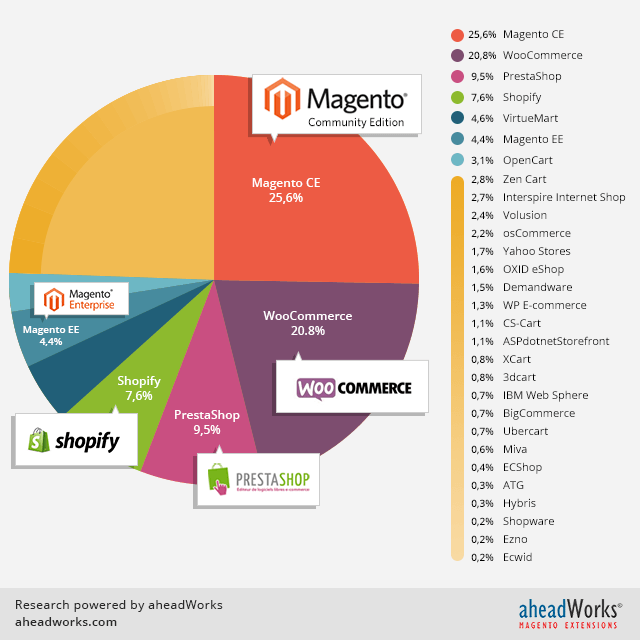11 May 2015 Magento Vs WooCommerce: Which Should You Choose?
We often get the same question from our clients:
Which e-commerce platform is right for my business?
Our answer… there is no one-size-fits-all solution for ecommerce. It all depends on your needs, the number of products, and the capabilities you want to integrate into your new site. The world of e-commerce has a huge range of available solutions.
Here at Wise Design Lab, we focus on development of two solutions that cater from small-medium to large business: WooCommerce and Magento.
Magento and WooCommerce are two of the biggest open source e-commerce platforms used today, they both offer a lot of flexibility, and have many developers supporting the platforms to grow.

Wise Design Lab is a big believer in using powerful Open-Source eCommerce for our client’s websites. Here’s why:
- Cost Effective Ecommerce Solution – As the software itself is free (open source), there are no upfront purchase costs.
- Market Leading Solution – Every open source solution we use is a market leader, and is constantly improving every year – means no out-of-date software.
- We Build it, You Own it – Since we’re using open-source, once we have built your website – it’s yours to keep.
Overview: Magento vs WooCommerce
Before we get into details, let’s take a quick look at both popular eCommerce platforms and what makes them stand out.
What is Magento
Magento is an open source eCommerce platform which allows businesses to create online stores, accept payments, and manage products. It has a community edition available for free download. It also has paid solutions which come with additional features, cloud hosting, and support.
What is WooCommerce?
WooCommerce is an open source eCommerce platform built on top of WordPress (world’s most popular website builder). It allows you to easily create an online store, accept payments, manage inventory, and more. It runs on top of WordPress, which gives you access to thousands of WordPress plugins and themes to grow your eCommerce business.
Both platforms are performance testing services, can be extended with extensions, and utilize templates for design. However, they both have different pros and cons which make them unique.
What to Look for in Your eCommerce Platform?
If you are just starting out, then you would want to keep a few things in mind when choosing a platform. These basic factors are crucial when deciding which eCommerce solution will be better for your business.
- Budget – Cost of starting your store and recurring expenses that would affect your business.
- Ease of Use – How easy is it to use for beginners
- Payment Methods – It should support multiple payment gateways. If you require certain payment methods, then you need to make sure that it supports them.
- Scalability – Your eCommerce platform should be able to scale with your growing business needs
These are just some of the basic things you need to look at. Depending on your business, you may also want to consider how the platform does other things like inventory, taxes, invoices, and more.
In this Magento vs WooCommerce comparison, we will review how both platforms compare on these basic requirements.
WooCommerce – Small to Medium size Business
- WooCommerce is ideal for small-medium businesses. It is economic and provides a fully functional store.
- WooCommerce is a WordPress plugin that lets you turn your WordPress site into a full-featured online store.
- Easy to use for customers and store administrators (store owner).
- If you are a small business with limited budget that wishes to start selling online, WooCommerce is for you.
- If you are a medium sized business that does not have an “IT Department” and requires a simple to use ecommerce store, WooCommerce is for you.
Magento – Medium to Large size Business
- Magento is ideal for medium-large businesses. It is a powerful ecommerce platform – geared toward better performing ecommerce websites.
- Magento ecommerce can be used as a B2C (regular retail business), B2B (wholesale trade only), and even we’ve seen being used in C2C business (multi-sellers marketplace).
- Magento comes packed with the characteristics facilitating layered navigation, advanced search, wish lists, favorites, product comparisons, multi store feature, email list, grouped products and content management system for static pages as well as SEO performance.
- Administration of websites is easier with Magento as compared to other ecommerce platforms because of reporting. Business owners get detailed report on the performance of their websites explaining info like what is on demand, what has gone out of stock, new items in market, etc.
- Magento have various tools and technologies to promote the business. More potential buyers could be attracted by branding as facilitated by Magento. Options like Private Sales, Flexible Coupons, Catalog Promotional Pricing, Multi-Tier Pricing, Bundled Products, Landing page Tools for Campaigns, etc are among these tools.
- Order management in a hassle-free way. Admin panel can create, view, edit and fulfill orders, raise invoices (one or multiple), print packing slip, create email notifications and RSS feed for new order, creation of reorder, etc.
- If you are a medium-large business that is ready to move from a smaller ecommerce platform to a full-featured ecommerce, Magento is for you.







